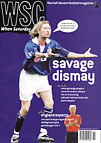 He has been at Chelsea since before the fall of the Berlin wall, yet has played barely 100 games. Mike Ticher looks at the enigma of the underemployed keeper
He has been at Chelsea since before the fall of the Berlin wall, yet has played barely 100 games. Mike Ticher looks at the enigma of the underemployed keeper
“Yesterday upon the stair I met a man who wasn’t there. He wasn’t there again today. I wish that man would go away.”
Sometimes in his 13-year career at Stamford Bridge it seemed Kevin Hitchcock was that man. Not there yesterday, not there again today – though no one wished him gone. Since signing from Mansfield in March 1988 for £250,000, he has seen nine other keepers pass through, but made only 96 league appearances himself. Yet unlike such itinerants as John Burridge or Les Sealey, he only went on loan twice, to Northampton (17 games) and to West Ham (no games).
It’s a frankly feeble total, considering he had already played 182 league games before coming to Chelsea towards the end of a nightmare relegation season, when Eddie Niedzwiecki’s retirement forced the club to field Roger Freestone and Perry Digweed in goal before settling on the 26-year-old East Ender. His record compares oddly with that of Freestone, who went to Swan- sea in 1991 and has been virtually ever-present since. Dave Beasant too, a later Chelsea rival, has racked up well over 700 games and seems reluctant to stop.
As a keeper, Hitchcock was, well, non-descript. Not especially big, certainly not flamboyant, but not quite reassuring either. He had an unlucky start at Chelsea. In his first full season he played in three of the first six games (all defeats) before getting injured, after which the team lost only twice more and strolled back to the First Division. Hitchcock did his cruciate in a reserve game at Christmas, just when Freestone, in Kevin’s words, was “having a little wobble”. Bobby Campbell splashed £750,000 on Beasant, the first of many buys who would keep Hitchcock waiting patiently on the sidelines.
He was on a week-to-week deal and injured again when Beasant fell from favour after letting in three comical goals against Norwich in 1992, but responded to manager Ian Porterfield’s suggestion that he should play with an in- jection to “prove to him that I was worth a contract”. Beasant went on loan to Grimsby and Wolves, got his confidence back and moved on. Kevin stayed, and even put together 40 games in two years, though his competition now came from abroad as well, with the arrival of Dmitri Kharine in December 1992.
Chelsea’s fortunes improved, but Hitchcock’s did not. In 1994 they got to the Cup final, but the reserve keeper played only twice all season (“I remember the one at Leeds – man of the match in a 4-1 defeat”). Again he might have left, but got a new role when the rules changed to allow a goalkeeper as an extra substitute. When Kharine was injured at Hillsborough in September 1996, Hitchcock was off the bench and into the team in the first breathless flush of the Gullit revolution. Glory at last? No. By the end of the season Chelsea were back at Wembley to win the Cup, but again Kevin was not between the posts. Another import, Frode Grodas, who played just 27 games for Chelsea, was.
Since then, Hitchcock’s chances of getting a game have becoming ever more fanciful. His last was at Tottenham in May 1999, and at 39 he is not going to get another, even if Ed De Goey keeps throwing them in, Carlo Cudicini gets injured, Mark Bosnich rows with the coach, Rhys Evans is abducted by aliens and Lenny Pidgeley proves to be nothing more than a made-up name. Yet he has never seemed keen to move on, to drop down the divisions for first-team football, preferring to settle for a role somewhere between faithful retainer and licensed jester at the club.
So what’s it all been for? Gianluca Vialli called him “a lad that everybody loves”. He is, by common consent, the best golfer at the club. But on the football field his honours stopped with the 1987 Freight Rover Trophy final, when he saved two penalties in a shoot-out against Bristol City. Perhaps a clue to the way his career has gone lies in his attitude when he first trained at Chelsea as a teenager. “I was never forward enough. Just used to do my training and go home.”
Or, as his wife Fiona put it: “It doesn’t always pay to kick up a fuss.” Mustn’t grumble. Just do your training and go home. But, she added, though Kevin sometimes got depressed, “He’s got a good family to keep him going. He’ll always be our No 1.” And, given the chaotic domestic life of a keeper as driven as, say, Peter Shilton, who is to say Hitchcock has missed out on what really matters?X
From WSC 177 November 2001. What was happening this month